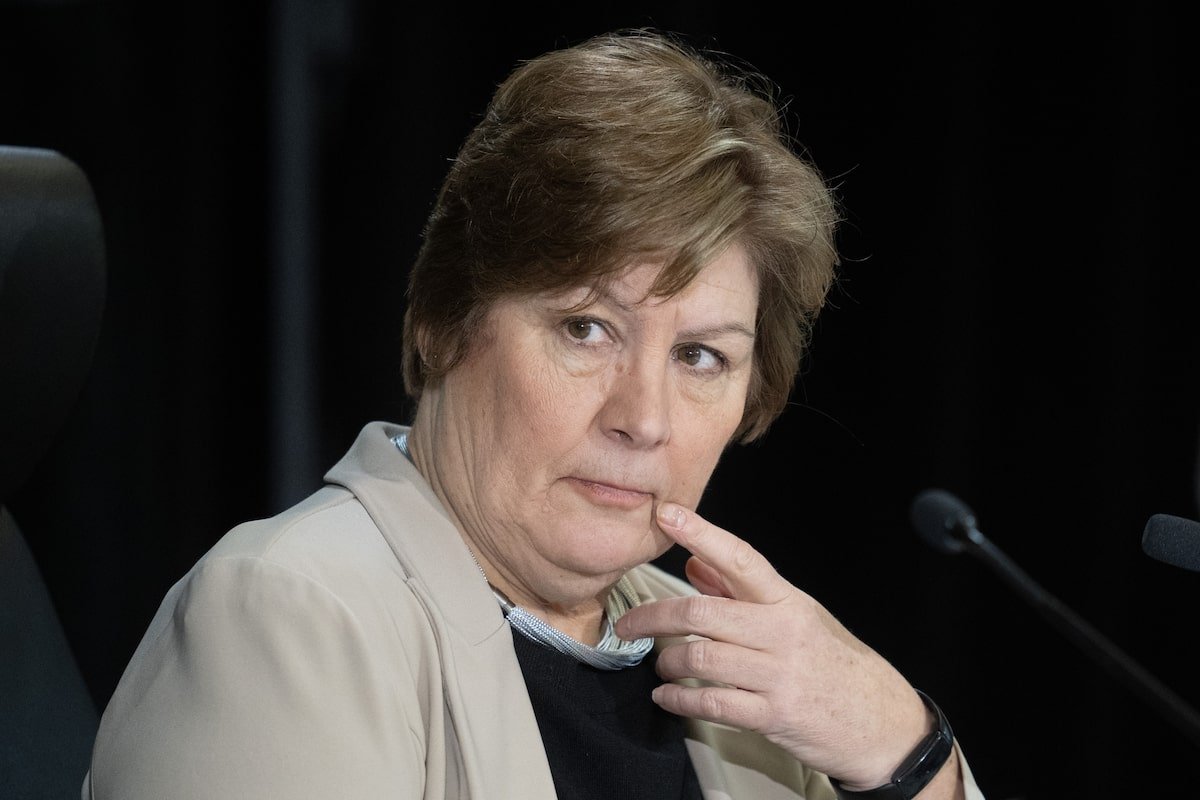
Justice Marie-Josée Hogue, the commissioner of the inquiry into foreign interference, said she did not examine transnational repression in depth because she felt it ‘goes well beyond the democratic processes and institutions my mandate tasked me with examining.’Adrian Wyld/The Canadian Press
Leaders of Canadian activist groups targeted by Beijing say they’re dissatisfied with the conclusions of the public inquiry into foreign interference because it failed to take seriously the threats that hostile foreign states pose to their communities and did not propose measures to counter their bullying, harassment and intimidation.
In her final report Tuesday, the inquiry’s commissioner, Justice Marie-Josée Hogue, said she did not examine transnational repression in depth because she felt it “goes well beyond the democratic processes and institutions my mandate tasked me with examining.” Transnational repression, a form of foreign interference, refers to foreign powers extending their reach into Canada to intimidate, silence, coerce or harm people left their homeland to come to this country.
The terms of reference provided to Justice Hogue had asked her to examine and assess the capacity of relevant federal departments, structures and processes “to detect, deter and counter any form of foreign interference directly or indirectly targeting Canada’s democratic processes,” including in relation to “supports and protections in place for members of a diaspora who may be especially vulnerable and may be the first victims of foreign interference in Canada’s democratic processes.”
The inquiry heard from representatives of Canadians who trace their roots to Hong Kong, Tibet, Uyghur settlements in Xinjiang, Iran, Russia, Ukraine, Eritrea, Ethiopia’s Tigray region, Sri Lanka’s Tamils and Sikh populations in India.
They testified about being bullied and intimated by officials in those countries – particularly China, India, Iran and Russia – and how they can make life extremely difficult for their families back home when they dare to question the regimes.
Mehmet Tohti, the executive director of the Uyghur Human Rights Advocacy Project, said he had counted on meaningful proposals from Justice Hogue, only to be disappointed when she concluded that Canada had a “robust and resilient” system to deal with foreign interference.
“A hostile regime will interpret this complacency as an indirect green light,” he said. “I expected a wake-up call, a serious reckoning that would lead to the creation of a stronger, more effective mechanism for protection and self-defence.”
Friends of Hong Kong said Justice Hogue had downplayed foreign interference as “isolated cases,” saying the inquiry showed “willful blindness” to the concerns of diaspora communities.
“By describing transnational repression as a ‘genuine scourge’ but not as a real threat, she adds another blow to the confidence of the diaspora communities, members of which are under constant fear and threats,” the group said in a statement.
Justice Hogue said the activities of some parliamentarians in their dealings with foreign powers were problematic and troubling. In her report, she criticized the June, 2024, findings of the all-party National Security and Intelligence Committee of Parliamentarians, which said some politicians were “semi-witting or witting” participants in the efforts of foreign states to meddle in Canadian politics.
While some parliamentarians showed poor judgment and troubling conduct in dealings with foreign powers, Justice Hogue concluded their actions did not amount to treason.
“Justice Hogue just demonstrates that she and her team do not fully understand the extent and threat that such parliamentarians pose to Canadian democracy,” Friends of Hong Kong said. “Worst, it is apparent that Canadians should not expect there would be any serious consequences for such parliamentarians.”
In her report, Justice Hogue acknowledged the inquiry only “scratched the surface” of transnational repression and urged the government to find an effective response.
She identified China, India and Iran as the principal agents of transnational repression in Canada.
In submissions to the inquiry, diaspora groups said government funding should be made available for them to educate their members in reporting incidents and identifying signs of foreign interference. They urged the inquiry to recommend that Ottawa set up a national hotline so the public can report “any incidents of infiltration or foreign interference.” Justice Hogue made that very recommendation to the government in her final report.
Some diaspora leaders also called on Canada to ban TikTok and WeChat, a Chinese-language social-media app that has allegedly been weaponized to spread disinformation and whose parent company is obligated under Chinese law to share data with Beijing.
The World Sikh Organization of Canada called for immediate action to fully examine and address what the inquiry described as India’s “increasingly aggressive and violent” transnational repression activities targeting Sikhs in Canada. The organization’s president Danish Singh also urged Ottawa to initiate a public inquiry into the June, 2023, murder of Sikh activist Hardeep Singh Nijjar by alleged agents of India.
“The Government of India’s targeted acts of violence, disinformation and intimidation cannot be tolerated. Canada must continue to respond decisively to protect its citizens and uphold its values of justice and freedom,” Mr. Singh said.
China and India have refuted claims they are behind any foreign interference in Canada and argue that Ottawa is meddling in their politics. China’s embassy in Ottawa said the report “made groundless accusations and smears” against Beijing.
